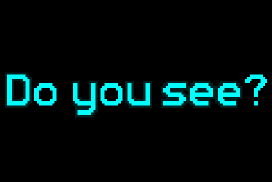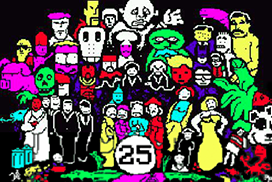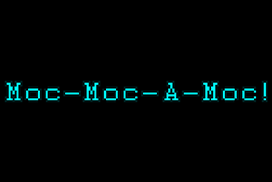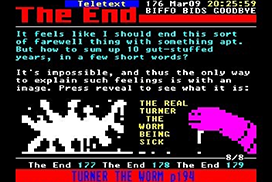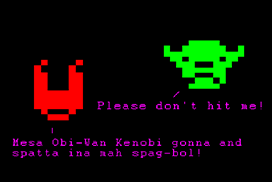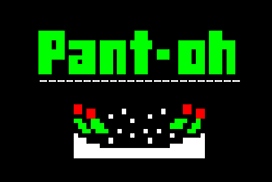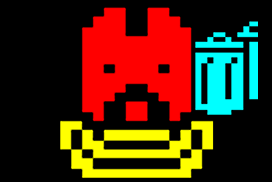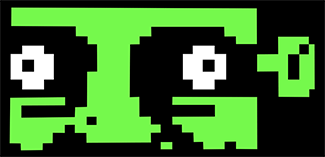
Page 30, press hold, and reveal. Digitiser's founder speaks out

|
Let me tell you a story
Edge #138, July 2004
Children say the funniest things. You know: "This lolly tastes like you put poison on it", and: "Daddy, do I have to sleep in the cupboard under the stairs like I'm a mouse?" Such is the gloriously intoxicating innocence of youth.
Recently, I was settled into the sofa for an extended session of Super Monkey Ball 2. Two of my 47 daughters, as they often do, settled down at my ankles to patiently await their turn. As they watched the encased simians going about their colourful rolling, they turned to one another.
"Why do you think the monkeys are doing this?" asked one. "What's it meant to be about?"
"It's just about having fun," replied the other.
And how right she was. It may seem glib, but games, by and large, should be about having fun. I wouldn't have to state it if more game developers understood. Story has no place in games — at least, not in arcade-style games (If 'arcade-style' isn't an anachronism these days). It's an unnecessary distraction. Unfortunately, the newest generation of gamers seem to expect games to have a storyline. Even those of us who've been playing for the best part of our lives are becoming brainwashed by the obsession with stories.
Admittedly, there's a certain purpose to the story in, say, RPGs (though I've yet to play one that really gripped me, adhered to traditional story structure or had any great ambition to be original), and adventure games (likewise, they're mostly a justification for a series of logic puzzles). Jak II is one of the slickest actioners of recent years. It's a melting pot of gaming styles, and a breeze to pick up and play, but do we really need to know that Jak is 'driven by a burning rage'? That he spent 'two years in a cold, dark, jail cell, subjected to torturous experiments'? Yet its these facts that are emblazoned on the packaging, above the details of the actual gameplay. If I want a story about someone driven by rage I'll watch Falling Down. Or Taxi Driver. Or, heck, Return Of The poxy Jedi.
Chances are most of you reading this started playing videogames when you were children. When you first played Donkey Kong did you need to know Jumpman was a 'tortured plumber, wrongly accused of suffocating a string of beautiful women with banana skins'? Did you need to hear how he 'sets out on a desperate mission to save his beloved, clear his name and capture the real culprit — a maladjusted, genetically engineered super-ape'? Or did you just need to know it was about jumping over barrels to spite the monkey?
Admittedly, not every classic game lacked a plot. Skool Daze had a storyline of sorts - get your school report back from the headmaster before you were suspended. And Ant Attack was something to do with ants and hand grenades. They were the bare minimum of 'plot' needed to justify the gameplay, and just enough to satisfy those who hammered their fists against Pac-Man cabinets, spluttering "Why, whyyyy, whyyyyy..?!?"
There was a time when games didn't have plots, or backstory. There was a time when the people making games weren't trying to be Martin Scorsese, or George Lucas. They were 'merely' trying to make great games. You know — back in the days when the people who did the graft were the ultimate arbiter of what a game was.
This is precisely why the Sonic Adventure games got it so painfully wrong. Sonic has never been about stories. When Sega got the series right, it's been about mainlining pure arcade thrills direct into the pleasure centres of the brain. Having your — ahem — intellectual glands stimulated by some sort of pointless plot-thing was just wrong in every single respect, which Sega indirectly admitted by releasing the relatively plotless Sonic Heroes. Unfortunately, it also dropped pretty much everything else which ever made the Sonic games fun, but that's another story For a time, Sega got caught in this industry's absurd preoccupation with telling a story.
When I was working on the story for ZedTwo's Pillage (or Future Tactics: The Uprising, or whatever it's called these days), it was borne out of a gameplay conceit set by the creators: none of the characters could die. I enjoyed the challenge, and was determined to devise an original scenario and world wherein, firstly, none of the player characters could die, yet there was still something at risk. Secondly, create a group of characters the player cared about. Thirdly, tell a story which didn't make you want to skip the cut-scenes and integrated the levels as separate plot beats. And, lastly, send up some of the conventions of gaming by subverting clichés.
Once I began, I could see how easy it was to get carried away and forget you were writing for a game. As somebody who, on the whole, skips cut-scenes, I had to fight my instincts to keep mine to a minimum. Unfortunately, I did get carried away with the plot, and initially went all Arthur C Clarke on ZedTwo's ass. Early drafts struggled to balance characterisation, exposition and brevity. I started to choke on my own ambition, and it took 18 months or so to fish the chicken bone out of my throat.
Were we successful? I don't know. If I was coming to Pillage as an outsider, I'm not convinced I wouldn't skip the cut-scenes. I'd like to think I wouldn't enjoy the levels as much if I didn't play through the framing sequences. But, as with most game storylines, I couldn't say the plot is crucial. It may explain the central gameplay premise, but the story is of secondary importance. Which is, at least, something we did get right.
I doubt anything I can say is going to stifle game producers' ambitions as screenwriters. It's just depressing that more aren't confident in their abilities as game creators to focus on gameplay, rather than trying to hide it behind narrative. Perhaps it wouldn't matter as much if more developers were accomplished storytellers. Or if, in the cases of professional storytellers brought in to create the stories for the games, they really understood about games. And before any of you RPG freaks start on the abysmal 'mature' storytelling and themes in the Final Fantasy series I should inform you of two things: I know where you live, and I own a really powerful gun.
Mr Biffo is a semi-retired videogame journalist. His views do not necessarily coincide with Edge's
Do you know of any important moments from the annals of Digi history that have been omitted? If so, then mail me (superpage58@gmail.com) right now, man. Credit will be duly given for anything that gets put up.




